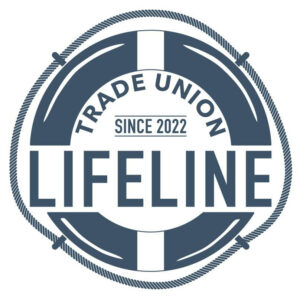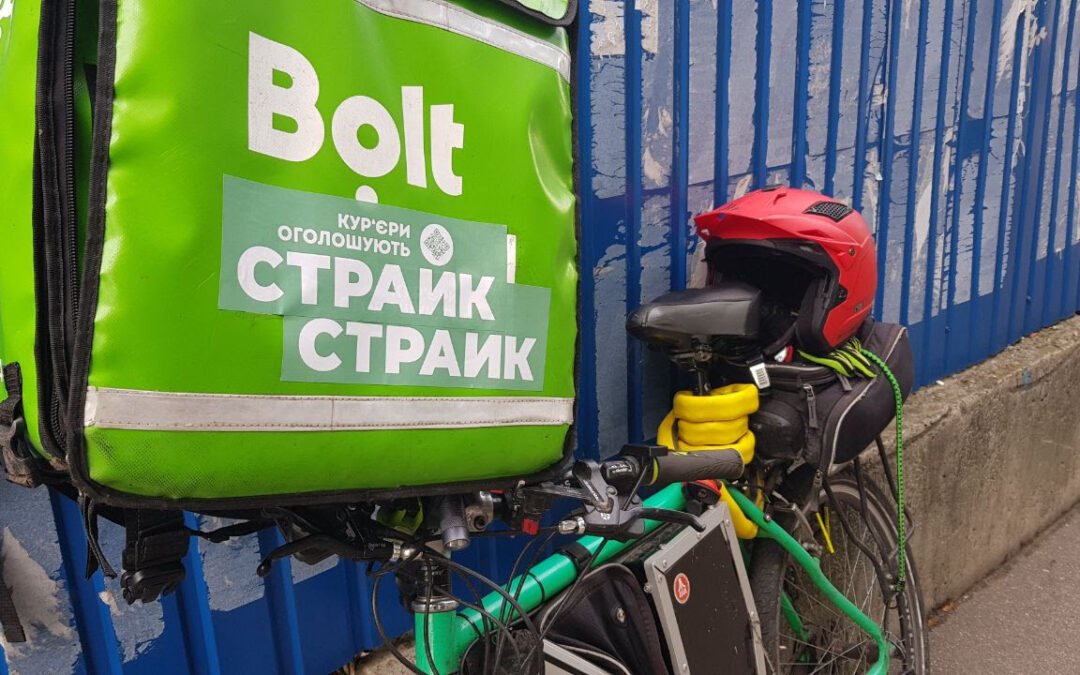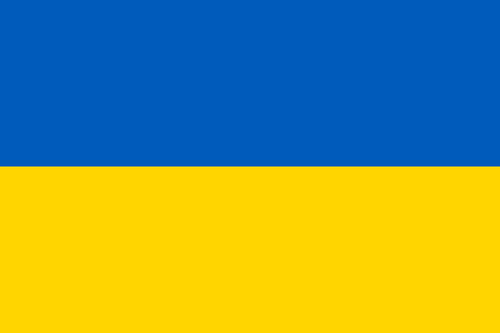
May 25, 2022
The Anna Lindh Memorial Fund in Stockholm awarded a special prize to the Trade Union Lifeline in Kyiv, Ukraine. The Lifeline is run by an informal group of primarily young trade union activists from key economic sectors such as railways, public service, food processing, delivery services and the platform or “gig” economy which aims to utilize union networks to quickly move humanitarian aid through the country to areas of emergency need.
 The Solidarity Center and its Ukrainian partner, Labor Initiatives, are key participants in the Trade Union Lifeline, and the Solidarity Center’s Kyiv office is the main hub for its activities. Since the beginning of the war, the Lifeline has worked to link workers in key industries with charitable organizations and other civil society groups to move food, medical supplies, and other needed items to war-impacted communities. The LI’s Donbas office in Dobropillia has been a critical hub for this support and has helped thousands of refugees in the region find safety in other parts of Ukraine.
The Solidarity Center and its Ukrainian partner, Labor Initiatives, are key participants in the Trade Union Lifeline, and the Solidarity Center’s Kyiv office is the main hub for its activities. Since the beginning of the war, the Lifeline has worked to link workers in key industries with charitable organizations and other civil society groups to move food, medical supplies, and other needed items to war-impacted communities. The LI’s Donbas office in Dobropillia has been a critical hub for this support and has helped thousands of refugees in the region find safety in other parts of Ukraine.
“The youth network Trade Union Lifeline has, through admirable relief efforts in Ukraine, shown proof of real union solidarity, not only for members but also broadly in Ukrainian society,” says Lena Hjelm-Wallén, chair of the Anna Lindh Memorial Fund.
The Anna Lindh Memorial Fund annually honors individuals and organizations that help others and strive for a more humane and just world. The Fund was created soon after the assassination of Anna Lindh, a Social Democratic politician whose two-decade career included service as a member of the country’s parliament, the Riksdag, Deputy Mayor of Stockholm, and Minister of Environment and Foreign Affairs.
The Fund’s $5,550 prize will be awarded at a ceremony in Stockholm on June 16.

May 18, 2022
Platform delivery workers in Ukraine, many of them displaced from their homes, are demanding decent wages as they continue to work in the midst of war.
On May 12, delivery drivers in Lviv went to Bolt Food’s headquarters to deliver their suggestions and seek an open dialogue with the company. Participants dressed to conceal their identities because they say the company has punished workers in the past with “robo-firings” and “robo-suspensions” by excluding them from the app.
Many of the delivery riders in Lviv have fled cities impacted by the war in Ukraine. In several cases, they are homeless or the only breadwinners left for their families.
In a video produced by Ukraine’s Labor Initiatives, workers describe their situations.
“I am from Mykolaiv,” says one worker. “Mom and Dad lost their jobs there. I don’t have a place to live here and I don’t even have enough money to eat. Bolt … said they would support favorable conditions. Both for themselves and for couriers. But they simply did not warn anyone, removed the minimum pay, lowered all the ratios.”
“How are the IDPs supposed to live,” he asks, “who have no housing, no work [and] don’t have anything to eat?”
Another worker describes the deterioration in pay. “They took away the minimum payment for delivery. And the ratios were reduced by almost half. Here a colleague has calculated that it, approximately, will give a reduction of wages by 52 percent.”
Workers said the company has failed to explain the reasons for the changes. Meanwhile, workers who rely on cars and motorcycles and have to keep their vehicles fueled in order to work face rising gas prices.
“Fuel is among my expenses,” said one worker. “Now I don’t know if I can even pay for it.”
The demands of these workers clearly show that platform-based companies abuse worker rights in extreme environments using the technology the companies have set up to maximize profits.
Delivery companies are “not regulated properly,” one delivery rider said. “Each service acts as they want. Some platforms employ people as ‘private entrepreneurs,’ some just saying ‘You are plugged into the platform” and you should be grateful for it. Because of that, many issues arise.
“And if after all this,” he continued, “some trade unions … will be formed, that will be great. People should have the instrument to solve the issues. Strange as it may sound, that may even be worth their lives.”

Mar 11, 2022
A number of Ukrainian trade unions, including the national union of nuclear plant workers, have donated portions of their salaries to Ukrainian aid and defense charities. In the first 10 days of the war, these trade union salary donations amounted to nearly $500,000.
One of the largest private-sector unions in Ukraine, the trade union of Nova Poshta (a shipping and logistics firm with operations also in Europe and the United States), conducted national and international fundraising to support its members displaced and in need, as well as the families of volunteers for Ukraine’s Territorial Defense Forces. In the first week of the war, the Nova Poshta trade union collected 795,000 hryvnia (about $27,000) for member assistance. In the first few days of outreach, 118 internally displaced people and refugees received aid, as did 45 families of members who were mobilized. The union expects this aid effort to grow quickly in the weeks ahead.
The Nova Poshta union, founded in 2015, signed its first collective bargaining agreement in 2016. Its pre-war membership was approximately 14,000 workers, and the collective agreement covers 27,000 employees.
The union’s work is in addition to that of the company, which is delivering humanitarian assistance from around the world to locations where it is needed most in Ukraine.
Although the Nova Poshta union is particularly active in solidarity support, many others are also assisting members during this crisis. These include fundraising and mutual aid efforts by the Union of Metal and Mining Workers, which has contributed over $35,000 to support families of mobilized soldiers.
Here’s How You Can Help
You can help Ukraine’s workers and their families by donating to the ITUC’s emergency fundraising appeal. The ITUC’s Ukrainian member organizations, FPU and KVPU, are providing support to families who desperately need assistance with food and water, medical supplies and hygiene items. Donate here.
You can also support these organizations also providing emergency assistance to people under bombardment or seeking refuge from the war:

Mar 4, 2022
Statement by the NED Family: The National Endowment for Democracy, the National Democratic Institute, the International Republican Institute, the Center for International Private Enterprise, and the Solidarity Center:
Vladimir Putin’s illegal and unjustified attack on a sovereign, free Ukraine is a watershed moment in the struggle for human freedom. To meet this moment, we are determined to support democracy activists on the frontline with the same sense of urgency they bring to their own national struggle. The National Endowment for Democracy (NED) and its four core partners—the National Democratic Institute (NDI), the International Republican Institute (IRI), the Center for International Private Enterprise (CIPE) and the Solidarity Center—stand in support and solidarity with our Ukrainian grantees, partners, staff, and their loved ones in Ukraine.
Since gaining independence in 1991, the people of Ukraine have time and again demonstrated their overwhelming desire to live in a free and democratic nation. We have been inspired as millions of Ukrainians have worked tirelessly and optimistically to build democratic institutions and practices in their country. Ukraine’s progress and commitment to this goal is what threatens and provokes Vladimir Putin. A democratic example on Russia’s border and a people with a shared culture and history who choose their own leaders, hold them accountable, and display a clear desire to join the community of democratic nations, represent an existential threat to Putin’s more than two-decade rule in Moscow and his ambition to dominate Russia’s neighbors.
Ukraine today is the epicenter of the fight for freedom in the world. The courage of the Ukrainian people—their willingness to risk everything to confront Russian aggression and defend their homeland—is an inspiration. They are a powerful example to all those worldwide who are joined in the struggle against authoritarian regimes that deprive free peoples of their basic rights and liberties, steal national wealth, attack and imprison political opponents, and silence independent media.
So too are the thousands of Russians and Belarusians who have risked arrest or worse to protest this criminal act of aggression. On Sunday, February 27, 2022, more than 10,000 people visited the memorial near the Kremlin marking the spot where Putin’s democratic rival, Boris Nemtsov, was assassinated seven years earlier. This is what Putin, and all dictators fear—ordinary citizens who would like to choose their leaders in free and fair elections and hold those leaders to account.
As the Ukrainian people struggle to preserve their sovereignty, their democracy, and their hopeful future, it is time for all those worldwide who live in freedom to rally to the cause of a free Ukraine.
Putin’s attack on Ukraine comes at a moment when democratic institutions are being systematically undermined across the globe and authoritarian regimes are growing in number and strength. Alert to a great danger, democratic societies should make every effort to secure the freedoms we cherish, the institutions we have built, and the values we have affirmed, to promote a more secure, just, and peaceful world.
Ukraine’s defense should become the valiant first chapter of a global democratic revival. In this task, we are committed to supporting a great coalition of courageous and creative political leaders, civic activists, independent journalists, labor organizers, entrepreneurs, and ordinary citizens who will lead the way.
MEDIA CONTACTS:
NED: Christine Bednarz, [email protected], (202) 200-6872
NDI: Victoria Benner, [email protected], (202) 728-5550
IRI: Ryan Mahoney, [email protected], (202) 914-1617
CIPE: Pam Kelley Lauder, [email protected], 202-721-9200
SOLIDARITY CENTER: Kate Conradt, [email protected]. 202-316-3301
Sep 7, 2021
Some 70 Bolt food delivery drivers in Ukraine are waging a digital strike after their wages were reduced by 50 percent, a move that built on the drivers’ discontent with lack of health coverage and cutbacks in bonus payments, a growing global phenomenon. The platform workers are turning off their apps each day at 2 p.m., making it difficult for the company to fulfill evening food orders.
“Transportation costs are the same, risks are the same, and money is half as much. It’s outrageous!” says Artem, a Bolt courier. Like many striking couriers, his backpack features a sticker supporting the strike.
Further cutting into drivers’ wages, he says, is the need to pay for constant bike or scooter repairs.
“For seven days of eight to ten hours of work, a courier covers more than 1,000 kilometers (622 miles) amid city traffic. Every day, you face potholes on the road, there is a constant need of repair, replacing some parts,” he says. “Income no longer covers risks.”
Bolt Founder a Billionaire, Workers Struggle for Pay
Although Bolt is a familiar brand in the United States for its green ride-sharing scooters scattered across urban areas, elsewhere in the world, the company rivals Uber as a delivery service, with 75 million customers in Africa and Europe, especially eastern Europe. In Ukraine, Bolt has 3.5 million customers served by fewer than 100 delivery drivers.
The company is valued at more than $2 billion, according to its Estonian founder Markus Willig, and raised $20 million in funding from the World Bank’s International Finance Corporation this year. With total fundraising at $596 million, the company seeks to expand further into Africa and plans to add markets in Latin America and Asia Pacific through franchising agreements.
Yet, even as Willig, 27, has become the third richest person in Estonia through Bolt profits, couriers who daily face dangerous conditions receive no income when they are injured and cannot work.
“You constantly hear about couriers getting into an accident, receiving medical treatment, having surgery,” says Artem. “If you suffer yourself, there must be a certain ‘cushion’ for you not to starve at least for the duration of treatment.”
Bolt workers in Ukraine are calling for a return to the previous bonus and payment structure, and pay for waiting at restaurants for orders. They also want health and life insurance and say the company should seek legislative measures to ensure scooters are registered.
Platform Workers Join Together to Demand Rights
Well before the COVID-19 pandemic boosted home delivery services, the demand for couriers and other essential workers was increasing around the world. But because they are classified as “independent contractors,” platform workers are ineligible for the same benefits as workers in the formal economy, and typically are not covered by a country’s labor laws.
Like Bolt workers in Ukraine, couriers from Nigeria to Colombia are joining together to demand their fundamental rights to decent work—living wages, social protections like health care, and measures to improve job safety.
Workers at Bolt’s Ukraine rival, the Spanish-owned Glovo, pushed for an increase in wages and paid insurance, revealing brutal working conditions in the process. Across Ukraine, unions are engaged in creative campaigns to reach gig economy workers, a campaign worker rights attorney George Sandul discusses in depth on The Solidarity Center Podcast.
In Colombia, Rappi platform delivery workers last year formed the Union of Platform Workers (UNIDAPP), to counter fluctuating pay rates for individual delivery jobs, unexplained fines levied by the company, and the arbitrary barring of workers from the platform to accept jobs.
Bolt workers in other countries are taking action as well. Earlier this year, the Independent Workers’ Union of Great Britain protested lack of safety for drivers following the murder of Bolt driver Gabriel Bringye. Research published by Oxford University in March found that Bolt and Amazon had the worst working conditions for gig economy workers in the UK.
In Tbilisi, Georgia, couriers at Bolt went on strike in March to protest lowered wages and what they say is a manipulated bonus system and unwarranted layoffs. Georgia couriers at Glovo also protested this past spring over lack of medical coverage for work-related injuries and changes to the app-based algorithm making it more difficult to get orders..
Bolt drivers in Lagos, Nigeria, part of the Professional E-hailing Drivers and Private Owners Association, went on strike in April to protest poor working conditions and pay. Bolt recently was forced to increase fares in Kenya after drivers in Nairobi threatened to strike over high fuel prices.
As Artem says, “We have to remind them that in a food delivery company, couriers are the ones who actually deliver, and without them the company does not exist.”

 The Solidarity Center and its Ukrainian partner, Labor Initiatives, are key participants in the Trade Union Lifeline, and the Solidarity Center’s Kyiv office is the main hub for its activities. Since the beginning of the war, the Lifeline has worked to link workers in key industries with charitable organizations and other civil society groups to move food, medical supplies, and other needed items to war-impacted communities. The LI’s Donbas office in Dobropillia has been a critical hub for this support and has helped thousands of refugees in the region find safety in other parts of Ukraine.
The Solidarity Center and its Ukrainian partner, Labor Initiatives, are key participants in the Trade Union Lifeline, and the Solidarity Center’s Kyiv office is the main hub for its activities. Since the beginning of the war, the Lifeline has worked to link workers in key industries with charitable organizations and other civil society groups to move food, medical supplies, and other needed items to war-impacted communities. The LI’s Donbas office in Dobropillia has been a critical hub for this support and has helped thousands of refugees in the region find safety in other parts of Ukraine.


